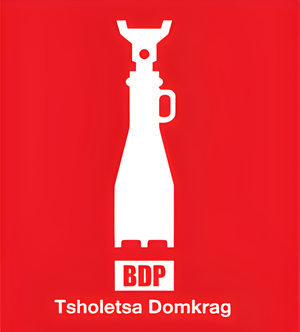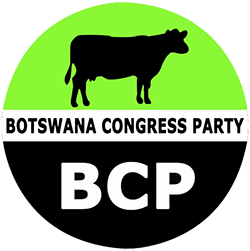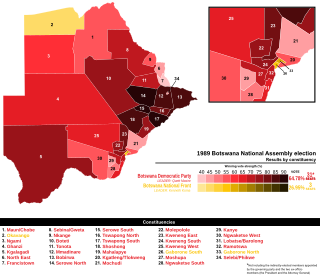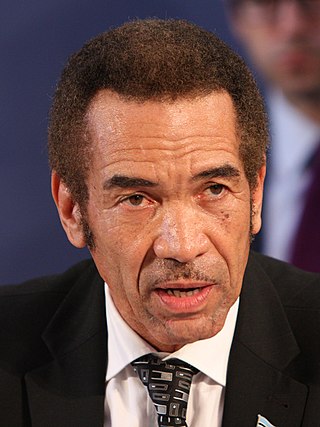Related Research Articles

Botswana is a parliamentary republic in which the President of Botswana is both head of state and head of government. The nation's politics are based heavily on British parliamentary politics and on traditional Batswana chiefdom. The legislature is made up of the unicameral National Assembly and the advisory body of tribal chiefs, the Ntlo ya Dikgosi. The National Assembly chooses the president, but once in office the president has significant authority over the legislature with only limited separation of powers. The Botswana Democratic Party (BDP) rules as a dominant party; while elections in Botswana are considered free and fair by observers, the BDP has controlled the National Assembly since independence. Political opposition in Botswana often exists between factions in the BDP rather than through separate parties, though several opposition parties exist and regularly hold a small number of seats in the National Assembly.

The Botswana Democratic Party is the governing party in Botswana. Its chairman is the Vice-President of Botswana, Slumber Tsogwane, and its symbol is a lift jack. The party has ruled Botswana continuously since gaining independence from the United Kingdom in 1966. The BDP is sometimes classified as a paternalistic conservative party and is also a consultative member of the Socialist International since 2014, which is a group including many worldwide social-democratic parties.

Aimé Henri Konan Bédié was an Ivorian politician. He was President of Côte d'Ivoire from 1993 to 1999, and latterly President of the Democratic Party of Ivory Coast – African Democratic Rally (PDCI-RDA). Prior to becoming president, he was a member and president of the National Assembly of Ivory Coast. He unsuccessfully sought another term as president in the 2020 presidential election.

The Botswana National Front (BNF) is a social democratic political party in Botswana. It has been the main opposition party in Botswana since the 1969 elections.

João Bernardo "Nino" Vieira was a politician who served as President of Guinea-Bissau from 1980 to 1999, except for a three-day period in May 1984, and from 2005 until his assassination in 2009.

General elections were held in Botswana on 30 October 2004, alongside local elections. The result was a ninth consecutive victory for the ruling Botswana Democratic Party (BDP), which won 44 of the 57 seats in the National Assembly.

The Botswana Congress Party (BCP) is a social democratic political party in Botswana. Founded in 1998 as a result of a split from the Botswana National Front (BNF), the party attracted most of the BNF's sitting MPs due to a leadership dispute involving the BNF's leader, Kenneth Koma.

Elections in Botswana take place within the framework of a multi-party democracy and a parliamentary system. The National Assembly is mostly directly elected, and in turn elects the President and some of its own members. The Ntlo ya Dikgosi is a mixture of appointed, hereditary and indirectly elected members.

The MELS Movement of Botswana is an anti-revisionist Marxist-Leninist communist party in Botswana without parliamentary representation. Themba Joina, a practicing lawyer, is the president of the organization. The name MELS is derived from (Karl) Marx, (Friedrich) Engels, (Vladimir) Lenin and (Joseph) Stalin.

The National Assembly is the sole legislative body of Botswana's unicameral Parliament, of which consists of the President and the National Assembly. The House passes laws, provides ministers to form Cabinet, and supervises the work of government. It is also responsible for adopting the country's budgets. It is advised by the Ntlo ya Dikgosi, a council of tribal chiefs which is not a house of Parliament.

General elections were held in Botswana on 16 October 1999, alongside local elections. The result was an eighth straight victory for the ruling Botswana Democratic Party (BDP), which increased its majority to 33 of the 40 elected seats in the National Assembly.

General elections were held in Botswana on 15 October 1994, alongside simultaneous local elections. The result was a victory for the Botswana Democratic Party (BDP), which had won every election since 1965. However, the elections also saw a strong performance from the Botswana National Front (BNF), which tripled its number of MPs and won all four seats in the capital Gaborone.

General elections were held in Botswana on 7 October 1989, alongside local elections. The result was the sixth straight landslide victory for the Botswana Democratic Party (BDP), which won 31 of the 34 elected seats.

Seretse Khama Ian Khama is a Botswana politician and former military officer who was the fourth President of the Republic of Botswana from 1 April 2008 to 1 April 2018. After serving as Commander of the Botswana Defence Force, he entered politics and was Vice-President of Botswana from 1998 to 2008, then succeeded Festus Mogae as President on 1 April 2008. He won a full term in the 2009 election and was re-elected in October 2014.
Ntwaesele Thatayone "Fish" Keitseng was a Motswana trade union activist and politician. Keitseng was one of the defendants of the 1956 Treason Trial in South Africa. Following his expulsion from South Africa, Keitseng organized a network of safe routes for thousands of African National Congress activists heading north. He was also a prominent leader of the opposition inside Botswana.

General and local elections were held in Botswana on 24 October 2014. The result was an eleventh straight victory for the Botswana Democratic Party, which won 37 of the 57 elected seats. Incumbent President Ian Khama was sworn in for a second term on 28 October.

The Umbrella for Democratic Change (UDC) is a centre-left alliance of political parties in Botswana.

Bathoen Seepapitso Gaseitsiwe also known as Bathoen II was a Motswana Kgosi, jurist and politician who served as Chief of the Bangwaketse from 1928 to 1969. He served as Chairman of the Botswana National Front (BNF) from 1966 to 1985, Leader of the Opposition from 1969 to 1984 and President of the Court of Appeal from 1985 until his death in 1990. He represented the Kanye South constituency in the National Assembly for three consecutive terms. As the leader of the BNF, the then second largest political party in the country, he was the main opponent of the Botswana Democratic Party (BDP) government, led by Seretse Khama and Quett Masire, during the first two decades of the African country's independence.

Gaobamong Kenneth Shololo Koma, popularly known as KK, was a Motswana intellectual and politician who served as the president of the Botswana National Front (BNF), the main opposition party from 1977 to 2001. He also served as a member of the National Assembly of Botswana, representing the Gaborone South constituency from 1984 to 2004 and held the position of Leader of the Opposition from 1984 to 2003. Alongside Bathoen Gaseitsiwe and Philip Matante, he is considered one of the primary opposition leaders during the first three decades of the Botswana Democratic Party (BDP) government's existence.
References
- 1 2 Makgala, Christian John. 'So Far So Good'?: An Appraisal of Dr. Ng'ombe's 1998 Prophecy on the Fate of the BNF
- ↑ Dingake, Michael. The Politics of Confusion: The BNF Saga 1984-1998 . Gaborone: Bay Publishing, 2004. p. 44
- ↑ Electoral Commissions Forum (Southern African Development Community), and Denis Kadima. Botswana Elections Observer Mission Report, 16 October 1999 . Auckland Park, South Africa: Electoral Institute of Southern Africa, 1999. p. 42
- ↑ Europa Publications Limited, and Taylor & Francis Group. The Europa World Year Book: 2008 . New York: Routledge, 2008. p. 940
- ↑ Sebudubudu, David and Bertha Z. Osie-Hwedie. http://www.giga-hamburg.de/openaccess/afrikaspectrum/2006_1/giga_as_2006_1_sebudubudu.pdf Archived 1 April 2022 at the Wayback Machine
- 1 2 3 Daily News. BOPA News on 21 July 2005
- ↑ IRIN. BOTSWANA: IRIN election briefing